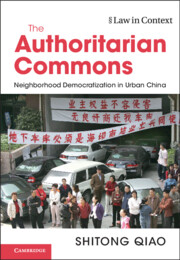Book contents
- The Authoritarian Commons
- Law in Context
- The Authoritarian Commons
- Copyright page
- Dedication
- Contents
- Figures
- Tables
- Acknowledgments
- Abbreviations
- Introduction
- Part I Theory
- Part II A Tale of Three Cities
- Part III Benefits and Risks
- Conclusion
- Appendix I: Summary of Research Methods
- Appendix II: Survey Data and Analysis
- Notes
- Bibliography
- Index
- References
Bibliography
Published online by Cambridge University Press: 21 December 2024
- The Authoritarian Commons
- Law in Context
- The Authoritarian Commons
- Copyright page
- Dedication
- Contents
- Figures
- Tables
- Acknowledgments
- Abbreviations
- Introduction
- Part I Theory
- Part II A Tale of Three Cities
- Part III Benefits and Risks
- Conclusion
- Appendix I: Summary of Research Methods
- Appendix II: Survey Data and Analysis
- Notes
- Bibliography
- Index
- References
- Type
- Chapter
- Information
- The Authoritarian CommonsNeighborhood Democratization in Urban China, pp. 216 - 234Publisher: Cambridge University PressPrint publication year: 2025

